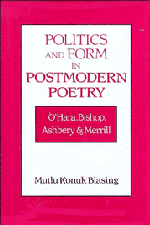Book contents
- Frontmatter
- Contents
- Acknowledgments
- Introduction: Poetry after Modernism
- Frank O'Hara: “How Am I to Become a Legend?”
- Elizabeth Bishop: “Repeat, Repeat, Repeat; Revise, Revise, Revise”
- John Ashbery: “The Epidemic of the Way We Live Now”
- James Merrill: “Sour Windfalls of the Orchard Back of Us”
- Notes
- Works Cited
- Index
- CAMBRIDGE STUDIES IN AMERICAN LITERATURE AND CULTURE
John Ashbery: “The Epidemic of the Way We Live Now”
Published online by Cambridge University Press: 12 March 2010
- Frontmatter
- Contents
- Acknowledgments
- Introduction: Poetry after Modernism
- Frank O'Hara: “How Am I to Become a Legend?”
- Elizabeth Bishop: “Repeat, Repeat, Repeat; Revise, Revise, Revise”
- John Ashbery: “The Epidemic of the Way We Live Now”
- James Merrill: “Sour Windfalls of the Orchard Back of Us”
- Notes
- Works Cited
- Index
- CAMBRIDGE STUDIES IN AMERICAN LITERATURE AND CULTURE
Summary
All along I had known what buttons to press, but don't
you see, I had to experiment, not that my life depended on it,
but as a corrective to taking tht frqin to find out where it
wanted to go.
Then when I did that anyway, I was not so much charmed as
horrified
by the construction put upon it by even some quite close
friends,
some of whom accused me of being the “leopard man” who
had been terrorizing
the community by making howl-like sounds at night, out of
earshot
of the dance floor. Others, recognizing my disinterest,
nonetheless accused
me of playing mind-games that only the skilled
should ever attempt. My reply, then as always, was that
ignorance
of the law, far from being no excuse, is the law, and we'll see
who rakes in
the chips come Judgment Day.
Ashbery (1991: 123)The avant-garde values of risk taking, process, and novelty are also John Ashbery's stylistic values, and his array of experimental techniques – mixed tones and dictions, grammatical and syntactic inconsistencies, referential instability, mixed metaphors, discontinuous forms – belongs to the repertoire of avant-garde verse. What makes for the difference – and the real novelty – of Ashbery's poetry is that he registers the changing cultural function of such techniques and increasingly acknowledges, after the early sixties, that experimental techniques and values are in fact consistent with the values of the larger cultural economy. And he turns his lateness to oppositional models of avant-garde writing to his advantage by calling such models into question even as he deploys them.
- Type
- Chapter
- Information
- Politics and Form in Postmodern PoetryO'Hara, Bishop, Ashbery, and Merrill, pp. 110 - 155Publisher: Cambridge University PressPrint publication year: 1995



